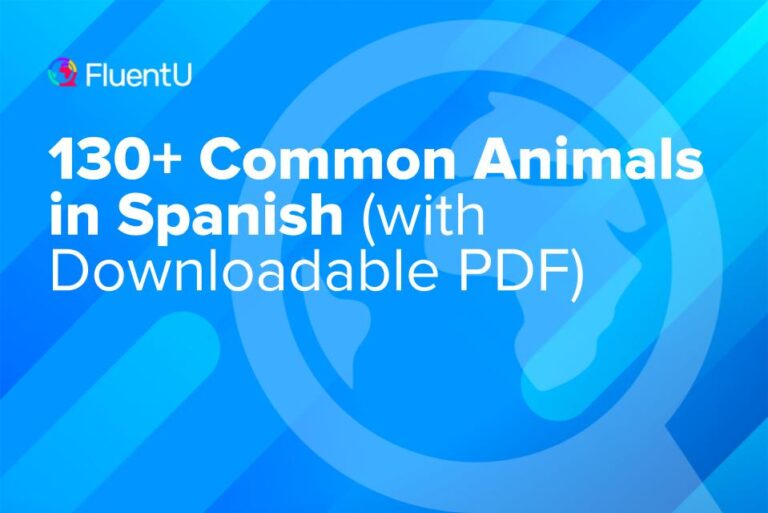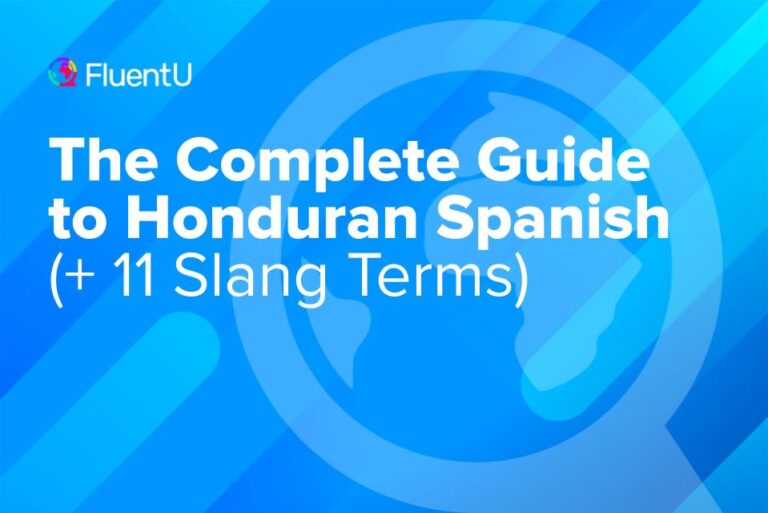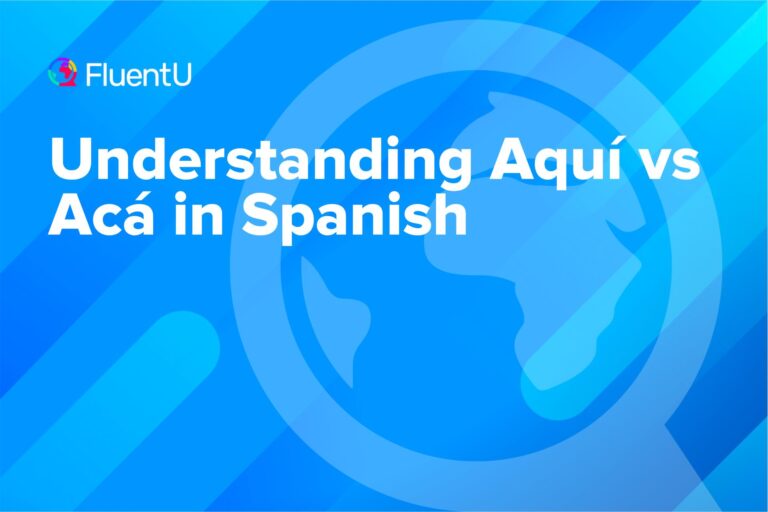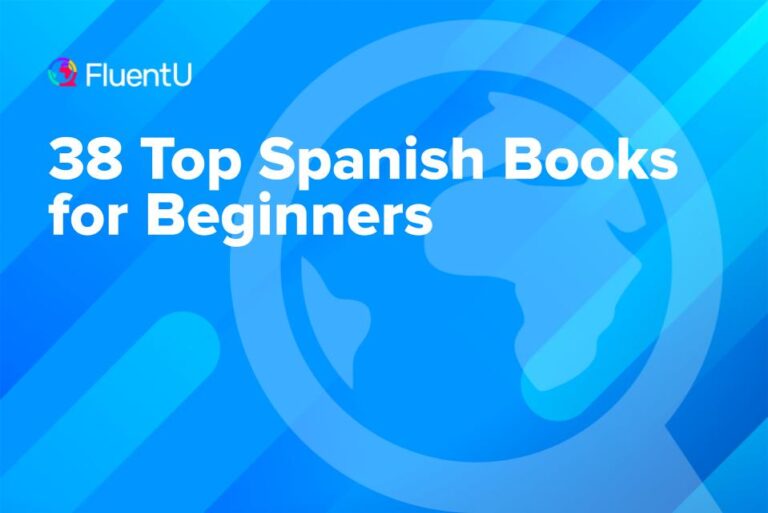40+ Common Cinco de Mayo Words
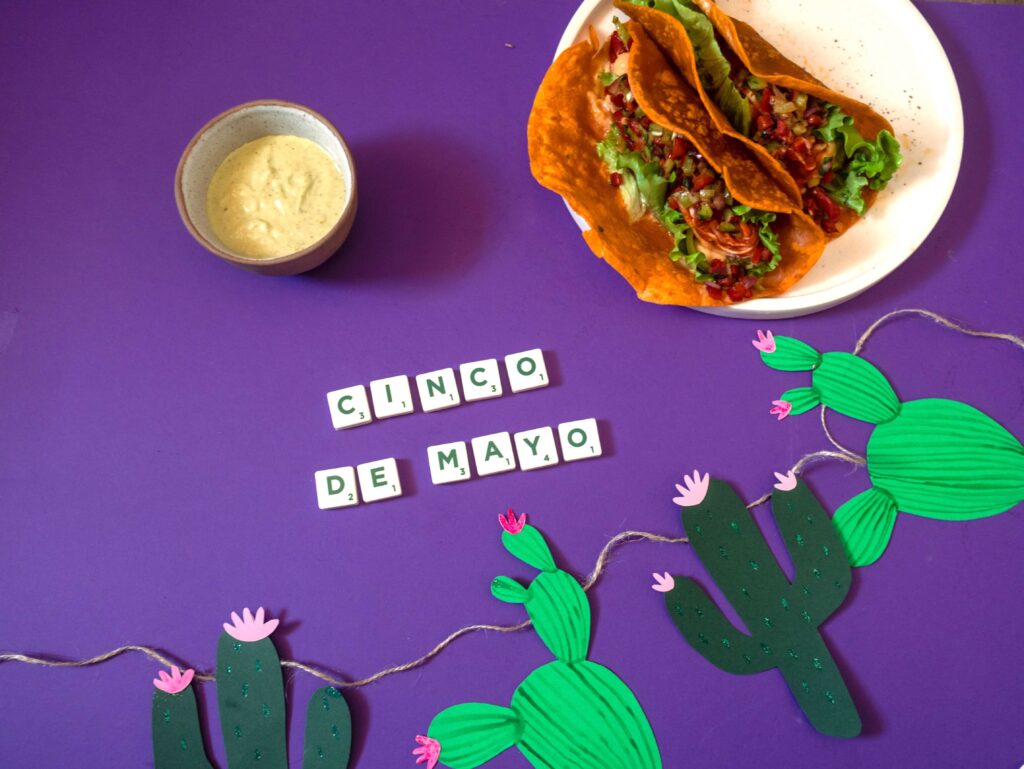
Cinco de Mayo marks the celebration of the Battle of Puebla which took place on the 5th of May in 1862.
Although it’s a celebration of Mexican patriotism and pride, it’s actually more widely celebrated in the United States than in Mexico.
In this post, you’ll learn over 40 Cinco de Mayo words so you can participate in more than just the eating and drinking!
Contents
Download: This blog post is available as a convenient and portable PDF that you can take anywhere. Click here to get a copy. (Download)
Spanish Words for Celebrating Cinco de Mayo
La comida (Food)
Here’s a bit of vocabulary concerning traditional Mexican cuisine that you’ll probably find at a typical Cinco de Mayo celebration:
1. Tortilla — Thin, round and unleavened pan (bread) prepared with harina de maíz (cornmeal) or harina de trigo (wheat flour) typically served hot with toppings or fillings.
2. Burrito — A popular Mexican dish consisting of a tortilla rolled around a relleno (filling) of carne (meat), frijoles (beans), queso (cheese) and other vegetables.
3. Taco — A zesty Mexican food consisting of tortilla (usually fried) rolled around or stuffed with filling of carne, queso, lechuga (lettuce) and a smattering of other things, depending on the cook.
4. Nacho — A tortilla chip typically served with dipping sauce (salsa, queso, guacamole) or topped with carne, queso and all the same roster of traditional ingredients.
5. Enchilada — A tortilla made of maíz (corn), rolled and filled with a mixture of simple, traditional ingredients (carne, frijoles, queso) and covered in a chili pepper sauce referred to as salsa de enchilada (enchilada sauce).
6. Tamal — A traditional Mexican plato fuerte (main course) consisting of seasoned carne and/or frijoles wrapped in dough made from harina de maíz and baked or steamed in corn husks.
7. Guacamole — Mashed or pureed aguacate (avocado) mixture with tomates (tomatoes), cebollas (onions), cilantro , pimientos (peppers) and various seasonings, usually served as a dip or topping.
8. Salsa — A spicy sauce/dip mixture made with tomatoes, cebollas, pimientos and cilantro.
9. Tequila — A strong Mexican liquor made from agave azul (blue agave).
10. Cerveza — Beer
11. Margarita — A cóctel (cocktail beverage) made with tequila, el triple seco (triple sec), lima (lime) or limón (lemon juice), and served in a glass topped with sal (salt) or azúcar (sugar). Just keep in mind that many people refer to both lime and lemon as limón!
Even if you already knew these words, at least now you can practice naming their ingredients in Spanish and pronouncing them like a native!
La historia (History)
Remember that Cinco de Mayo is not just an excuse to party, but has a real rooting in Mexican history and culture. Here are some words you can use to discuss the history of the holiday:
12. La batalla — Battle
13. La guerra — War
14. La bandera — Flag
15. Rojo — Red (one of the three colors of the Mexican flag)
16. Blanco — White (one of the three colors of the Mexican flag)
17. Verde — Green (one of the three colors of the Mexican flag)
18. Cinco — Five. This is the start of a little breakdown of the holiday’s name, in case you are wondering about these words. Many Latin American holidays are called by their dates, much like the 4th of July is in the United States. However, in Spanish we don’t use ordinal numbers for dates, so we’d say “el 4 de julio” to refer to the 4th of July.
19. De — Of
20. Mayo — May
21. Mil ochocientos sesenta y dos — 1862, which was the year of the Battle of Puebla.
22. Puebla — The city in Mexico where the 1862 battle took place.
23. El Día de la Batalla de Puebla — The day of the Battle of Puebla.
24. El soldado — Soldier
25. El Día de la Independencia — Independence Day. People often confuse Cinco de Mayo with Mexican Independence Day, which is actually celebrated on September 16th.
La fiesta (Party)
Here are some vocabulary words that may come in handy at your next Cinco de Mayo fiesta:
26. La celebración — Celebration
27. El baile folklórico — Folkloric dance
28. La música — Music
29. La pista de baile — Dancefloor
30. Las decoraciones — Decorations
31. El traje de charro — Traditional Mexican dress or suit, often worn by Mariachi bands. This is based on the clothing of a type of horseman called el charro.
32. El Mariachi — A Mexican folk band of at least five musicians who typically dress in charro suits and play guitar, trumpet, violin and vihuela.
33. Las maracas — Mexican rattles that make noise when shaken.
34. La piñata — A paper mache decoration filled with candy and hit with a stick to break open.
35. La matraca — Wooden Mexican noisemaker instrument
36. El sombrero — Traditional Mexican hat
37. El desfile — Parade
38. Las soldaderas — Military women of the Mexican revolution, typically represented in Cinco de Mayo parades by women wearing skirts and flowery hats.
39. Los fuegos artificiales — Fireworks
40. El anfitrión / la anfitriona — Host, as in the host of the party. Be sure to thank them!
Check out this post for more Mexican party slang and expressions.
Why Learn Cinco de Mayo Vocabulary?
You might be asking yourself, “Why do I need to learn vocabulary to drink margaritas, eat yummy Mexican food and listen to mariachi bands?” Sure, you don’t need any Spanish vocab to sit back and passively enjoy the festivities, but there are many reasons to brush up on your Cinco de Mayo vocabulary before the celebration starts.
First of all, as a Spanish language learner, it’s important to take advantage of any and all fun opportunities to use the language and improve your speaking skills outside of a classroom environment. What better time to practice your conversation skills than a Cinco de Mayo celebration? Or you can use the vocabulary to talk to a Spanish speaker about their perspective and experience of the holiday.
Secondly, learning holiday vocabulary can help improve your overall understanding of Mexican history and culture. In order to truly master a language, you need a good grasp of the culture upon which it stands. The more you can learn about Hispanic culture, the better your Spanish will be. You can do both on FluentU, where videos of native Spanish speakers are presented in conjunction with learning tools. It’s an immersive way to study the language and culture in one.
FluentU takes authentic videos—like music videos, movie trailers, news and inspiring talks—and turns them into personalized language learning lessons.
You can try FluentU for free for 2 weeks. Check out the website or download the iOS app or Android app.
P.S. Click here to take advantage of our current sale! (Expires at the end of this month)

Last but not least, communicating and showing interest in the culture at a Cinco de Mayo event will help you show your host that you appreciate their hospitality and that you’re genuinely interested in their cultural background. Remember, while the fiesta may be loads of fun, it’s more than just a party; it’s a celebration of historical victories and cultural heritage.
Tools for Learning More About Cinco de Mayo
There are many resources available that make learning Cinco de Mayo vocabulary both easy and fun. Here are some great resources to check out to enhance your learning:
- The Leaf Project (Language Education Access Foundation) provides an online written description on the history of Cinco de Mayo, as well as a vocabulary list and a series of videos on the history and traditions of the holiday.
- The History Channel offers a printable online study guide, curriculum and activities for Cinco de Mayo learning on their website.
- MyVocabulary.com provides interactive puzzles containing Cinco de Mayo vocabulary designed to make learning fun.
Now you have more than 40 Cinco de Mayo vocabulary words to talk about this popular holiday and its celebrations.
Enjoy the festivities and don’t be afraid to speak up and use these words when you have a chance.
And remember, if you’re going to celebrate this Mexican holiday, make sure you do it respectfully, without perpetuating harmful stereotypes.
¡Feliz Cinco de Mayo, amigos! (Happy Cinco de Mayo, friends!)
Download: This blog post is available as a convenient and portable PDF that you can take anywhere. Click here to get a copy. (Download)
And One More Thing…
If you've made it this far that means you probably enjoy learning Spanish with engaging material and will then love FluentU.
Other sites use scripted content. FluentU uses a natural approach that helps you ease into the Spanish language and culture over time. You’ll learn Spanish as it’s actually spoken by real people.
FluentU has a wide variety of videos, as you can see here:

FluentU brings native videos within reach with interactive transcripts. You can tap on any word to look it up instantly. Every definition has examples that have been written to help you understand how the word is used. If you see an interesting word you don’t know, you can add it to a vocab list.

Review a complete interactive transcript under the Dialogue tab, and find words and phrases listed under Vocab.

Learn all the vocabulary in any video with FluentU’s robust learning engine. Swipe left or right to see more examples of the word you’re on.

The best part is that FluentU keeps track of the vocabulary that you’re learning, and gives you extra practice with difficult words. It'll even remind you when it’s time to review what you’ve learned. Every learner has a truly personalized experience, even if they’re learning with the same video.
Start using the FluentU website on your computer or tablet or, better yet, download the FluentU app from the iTunes or Google Play store. Click here to take advantage of our current sale! (Expires at the end of this month.)
